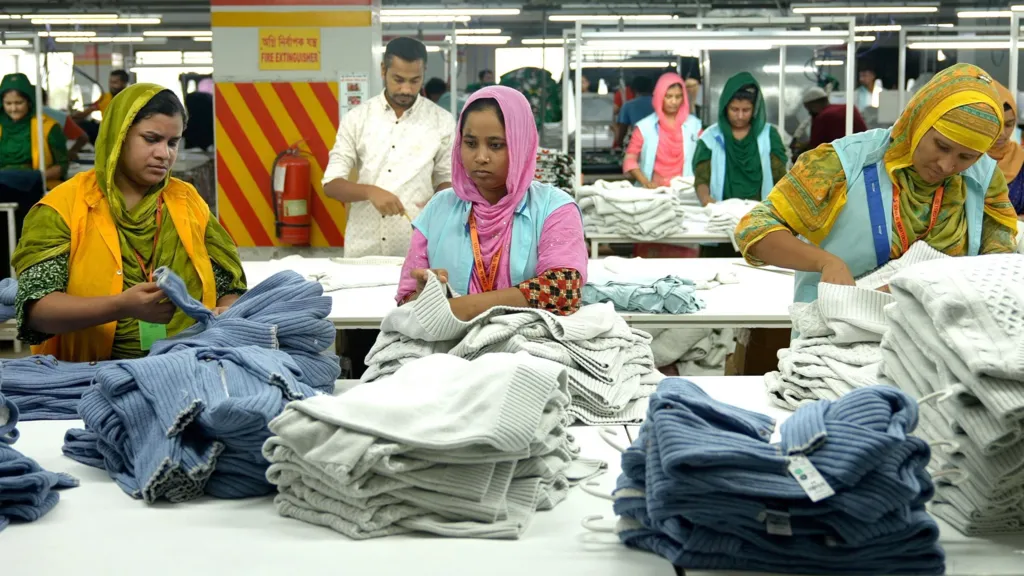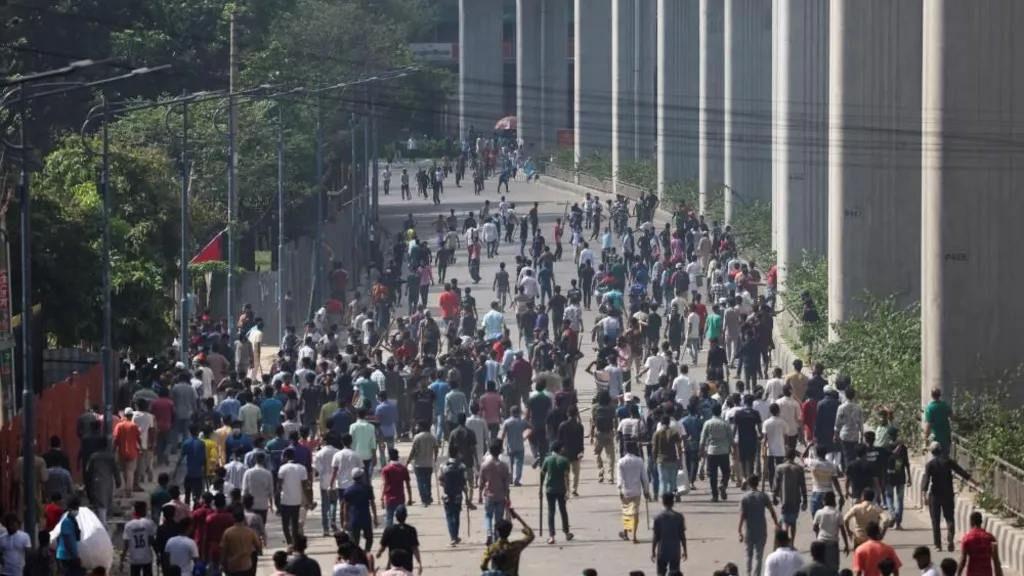The rapid expansion of the fast fashion industry has significantly impacted Bangladesh; however, the current economic challenges necessitate a more diversified approach.
Fast fashion drove Bangladesh – Bangladesh serves as a pivotal center for the global fast fashion industry. The garments produced in its factories are found on the shelves of major retailers such as H&M, Gap, and Zara. Over the past thirty years, this sector has significantly elevated the nation from one of the poorest to a lower-middle-income status. However, the garment industry, valued at $55 billion (£42 billion) annually, now faces an uncertain future following the recent protests that led to the ousting of Sheikh Hasina’s government in August, resulting in hundreds of fatalities. The unrest has seen at least four factories set ablaze, and manufacturers have encountered challenges operating amid a nationwide internet blackout. Consequently, three major brands, including Disney and Walmart, have begun seeking alternative sources for their upcoming clothing lines. The turmoil persists, with approximately 60 factories outside Dhaka anticipated to close starting Thursday due to ongoing worker protests, which include demands for improved wages.

Recent developments are expected to influence the confidence levels of brands, according to Mohiuddin Rubel, a director at the national association of garment manufacturers and exporters. He raises a pertinent question: “Should we concentrate all our resources in one area?” This concern is particularly relevant in light of competing garment-producing nations such as Vietnam. Kyaw Sein Thai, who operates sourcing offices in both Bangladesh and the United States, indicates that the ongoing political turmoil may lead to a decline in exports by approximately 10-20% this year. This figure is significant, considering that fast fashion exports constitute 80% of Bangladesh’s total export revenue. Prior to the recent turmoil, the garment sector and the broader economy of Bangladesh were already facing challenges. Issues such as child labor scandals, fatal accidents, and the repercussions of the Covid-19 pandemic had adversely affected the industry. Rising costs of production have made manufacturing increasingly expensive, while a decrease in demand has limited pricing power. This situation is particularly detrimental for Bangladesh, which is heavily dependent on exports. As export profits diminished, so too did the nation’s foreign currency reserves. Additional complications arose from excessive expenditures on high-profile infrastructure projects, which have strained government finances. Furthermore, widespread cronyism has undermined the banking sector, as influential business figures connected to the former Prime Minister Sheikh Hasina’s Awami League party have defaulted on loans. Dr. Ahsan Mansur, the newly appointed governor of the central bank, described this situation as “not benign neglect but a calculated exploitation of the financial system” in a recent exclusive interview with the BBC. He emphasized that addressing these issues is his primary focus, although he cautioned that it would require years of effort and additional financial assistance, including a potential IMF bailout. “We find ourselves in a challenging situation and are committed to meeting our foreign obligations in full. However, we require some additional support at this time,” Dr. Mansur stated.
Mahaburbur Rahman, whose family established the clothing manufacturing company Sonia Group two decades ago, emphasizes that the declining reserves of foreign currency in the country are sufficient to undermine confidence. “There are concerns regarding our ability to finance imports of yarn from India and China if we lack sufficient dollars. Many suppliers are unable to travel to Bangladesh to place new orders due to difficulties in obtaining travel insurance,” Mr. Rahman states. However, Bangladesh faces a more significant issue: the protests that led to the ousting of Ms. Hasina were fueled by students frustrated with the scarcity of well-paying jobs and opportunities. Although the garment industry has generated millions of jobs, the wages remain inadequate. Some factory workers interviewed by the BBC reported struggling to make ends meet on salaries that are less than half the national minimum wage, compelling them to take out loans to support their families. Many of these workers participated in recent student-led protests advocating for improved wages and working conditions. “We will accept nothing less than a doubling of our wages,” declared union leader Maria. “Salaries must reflect the rising cost of living.” The student demonstrators, however, are demanding a more comprehensive reform of the job market. Abu Tahir, Mohammad Zaman, Mohammad Zaidul, and Sardar Armaan, all of whom have been unemployed for periods ranging from two to five years, expressed to the BBC their eagerness to work in the private sector, yet they feel unqualified for the available positions. “My parents hardly grasp the competitiveness of the job market. Being unemployed is a significant source of stress for my family. I feel diminished,” Mr. Zaman remarked. “We obtain degrees, yet we lack the necessary skills,” Mr. Zaidul added. He expressed optimism regarding the new adviser, Muhammad Yunus, an entrepreneur himself, believing he may implement positive changes. Mr. Yunus is renowned for his groundbreaking work, having been awarded the Nobel Peace Prize.

Dr. Fahmida Khatun from the Centre for Policy Dialogue emphasizes the importance of economic diversification to fulfill the ambitions of the educated youth, asserting that such a strategy would benefit the economy. She states, “No country can sustain itself for an extended period relying solely on one sector. It may provide temporary success, but it cannot sustain growth indefinitely. While there have been attempts at diversification, they remain largely theoretical.” An abandoned technology park located near Dhaka exemplifies this issue. Established in 2015, it was intended to be part of a broader initiative aimed at generating higher-paying jobs and reducing Bangladesh’s dependence on the garment industry. However, it now stands neglected, symbolizing the economic shortcomings of the previous administration. Russel T Ahmed, a software entrepreneur, remarks, “This situation perfectly illustrates the disconnect between industry requirements and government provisions. No one consulted us regarding the necessity of these parks. While Bangladesh has focused on physical infrastructure, the investment in human infrastructure remains insufficient, which is essential for the industry’s growth.” Dr. Khatun advises that the new government must eliminate obstacles such as corruption and bureaucratic inefficiencies to attract foreign and private investments. Mr. Yunus has pledged to implement comprehensive reforms to revitalize the economy and restore institutions that, as Dr. Khatun notes, have been “systematically undermined” in recent years. He faces a significant challenge in stabilizing the economy, ensuring free and fair elections, and preventing government policies from being influenced by special interests. This must be accomplished while the country grapples with a multitude of other issues, including declining global demand for its products, worsening relations with its major neighbor and trading partner India, which is currently supporting Ms. Hasina, and the impacts of climate change leading to more severe cyclones in this flood-prone region. These challenges are as extensive as the expectations placed upon Mr. Yunus.
